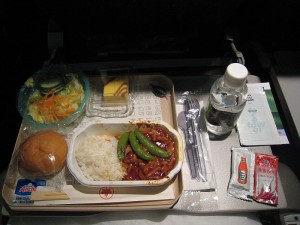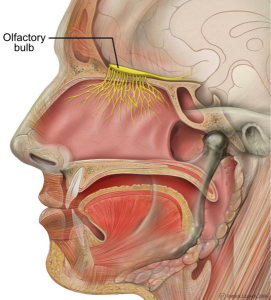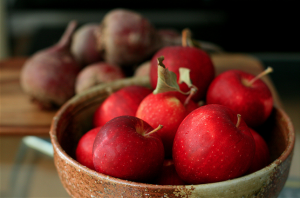Many people find being up in the air an unpleasant experience, from uncomfortable seats with little leg room to unappetizing meals. Why does the food that airline companies serve taste bland or unappetizing? It might not be the airline’s fault that the food tastes bland. Two factors can affect the taste of food: lack of humidity and lower air pressure.

Air Canada – International Flight Meal
Source: Wikimedia Commons
From the moment you leave the ground, the flavours of food become manipulated. This is due to the change of altitude and pressure of the plane. Taste and smell are one of the first senses to change at higher altitudes. Since one of the factors that can alter the flavours of the food is smell, it makes sense that taste will also change at higher altitudes. The pressure in the cabin of the plane dries out the nose first. A small area of mucous membrane that lines the inside of the nose contains olfactory nerves. It has hair-like projections that can detect smell. Olfactory nerve endings can be affected by the reduced humidity. In the parched air cabin, the odour receptors does not work properly and the effect of it makes the food taste twice as bland.

Olfactory Nerves in the Nose
Source: Wikimedia Commons
As the plane is ascending to higher altitudes, the change in air pressure will numb about ⅓ of the taste buds in your mouth. Taste buds contain many different types of taste receptors, each type detects one of the five basic tastes: sweet, salty, sour, bitter, and unami. Food in the mouth stimulates the receptors and triggers a nerve impulse in the nearby nerve fibre which are connected to cranial nerves. These signals are sent to the brain and the brain interprets the combination of impulses from taste and smell receptors. But before the impulse is sent to the brain, taste molecules must be dissolved in the saliva in order to reach and stimulate taste receptors. At high altitudes, the water content of saliva decreases and becomes more concentrated and viscous. This leads to dry mouth. Dry mouth makes it hard for the taste receptors to bind to taste molecules.
The combination of low humidity and pressure reduces the sensitivity of the taste buds and olfactory nerves that’s in our nose. No wonder why the meals that airlines serve taste different than meals eaten on land.
Here’s a video explaining how smell and taste are needed in order to taste the flavours in our food uploaded by chichin85:

– Elice Xie



